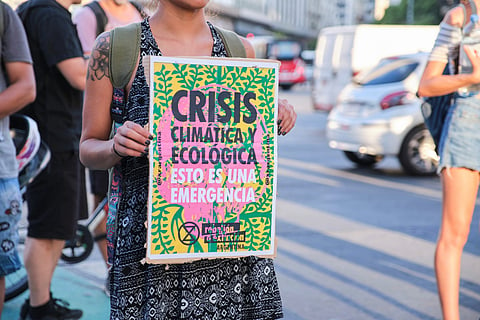Weekend Reads | Perceived Government Corruption and Lack of Climate Readiness
This weekend's read is Transparency International's Corruption Perceptions Index (CPI) 2024 report. The organization gathers data from 13 separate sources on how experts and businesspeople perceive the level of government corruption in 180 nations around the globe, and gives each one a rating from 0 to 100 where 100 means "very clean" and 0 means "highly corrupt."
What makes this report particularly interesting is that Transparency International doesn't simply report on perceived government corruption; it places corruption in the context of climate change. It argues that corruption and the climate crisis are "strongly intertwined" since governments control most of the resources needed to respond to climate change: both the amount of resources made available and also where they are directed. "In nations where corruption is pervasive," the report reads, "transparency in environmental decision-making is often compromised leading to unfair outcomes and the destruction of natural resources." It goes on to point out that corporate lobbying — even when legal and transparent — "presents additional challenges," even in countries that are perceived as having low levels of corruption, because it allows corporate interests to intervene in environmental policymaking.
Of the 180 countries it reports on, fully two-thirds scored less than 50; only eight scored 80 or above. Topping the list for the fourth consecutive year was Denmark, with a CPI score of 90; at the bottom were Venezuela (10), Somalia (9), and South Sudan (8). The United States earned an uninspiring CPI score of 65, tied with the Bahamas, which places it in the company of "flawed democracies."
The report argues that a lack of government corruption correlates with readiness for climate adaptation.
On the other hand, it says that a high level of corruption undermines climate readiness because it subjects climate policies and decision-making to undue influence; it allows for embezzlement and misuse of climate-response funds; it weakens climate protections; and it fosters threats to climate activists. On that last point, the report notes that of the 1,013 murders of climate activists globally since 2019, all but seven of them occurred in nations with a CPI score below 50.
The report makes four recommendations:
Put integrity at the center of climate efforts, so that they are beyond reproach and resistant to accusations of corruption (both real and perceived).
Enhance investigations, sanctions and protections to combat government corruption.
Shield the climate policymaking process from undue influence at all levels.
Strengthen citizen engagement in climate investments.
Sadly, these recommendations are very general and are easier said than done. Wherever wealth disparities exist, there are those with wealth who are willing to exchange some of it for power (usually the power to retain their wealth), and those with power who are willing to use it to accumulate wealth. And for a problem as large as climate change, which demands a high level of resources in response, some inevitably will try to take a slice of the resources for themselves.
Help keep BIPOC-led, community-powered journalism free — become a Rainmaker today.


